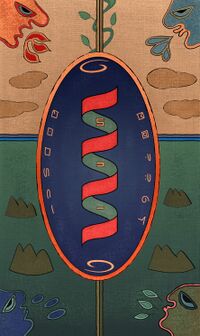Difference between revisions of "Dantrian calendar"
| Line 12: | Line 12: | ||
The calendar divides the year into 12 months, which allows researchers to apply the usual month labels to the dates. | The calendar divides the year into 12 months, which allows researchers to apply the usual month labels to the dates. | ||
| + | |||
| + | The dates, however, use a decimal system, as the widespread adoption of the Mandae system came much later. Therefore, the inhabitants of the Continent treat years as obeying a very special, somewhat alien numeric system, different from the usual arithmetic they use in everyday life. | ||
Revision as of 11:59, 4 January 2021
Dantrian calendar is the most used calendar on the Continent. It was established by the Western Dantrian civilization.
Based on the idea of cycles and the Quun Tirtoir (infinite staircase) of Lolion, the calendar conceptualizes history as "revolutions" of the spiral. The spiral does not turn by itself, but instead must be turned by the deeds of the living. Each important event turns the spiral farther, thus leading to the movement of time. Time stops of great deeds are not accomplished. From this idea comes the phrase "to make time turn", which means to change the world in a significant way.
In the calendar, each revolution is exactly 2000 years. Recorded history begins over 5000 years ago, with the current revolution being the third.
Dates are followed by letter FR, SR or TR, denoting first, second or third revolutions. For instance, 863 SR would be the year 863 of the second revolution. Centuries are abbreviated as "CFR", "CSR", etc. So, the current century is 11th CTR, which stands for "11th century of the third revolution". It can also be written as "11th century TR". In a sentence, revolutions and their ordinal numbers are typically not capitalized: "first revolution".
While in English such a system would pose a problem, since many ordinal numbers start with the same letters (first, fourth, fifth, etc.), the calendar's numerals are in Mandae, which uses separate letters for each of the ordinal numbers up to twelve. Thus, the dantrian calendar might run into problems only after the twelfth revolution.
The calendar divides the year into 12 months, which allows researchers to apply the usual month labels to the dates.
The dates, however, use a decimal system, as the widespread adoption of the Mandae system came much later. Therefore, the inhabitants of the Continent treat years as obeying a very special, somewhat alien numeric system, different from the usual arithmetic they use in everyday life.
